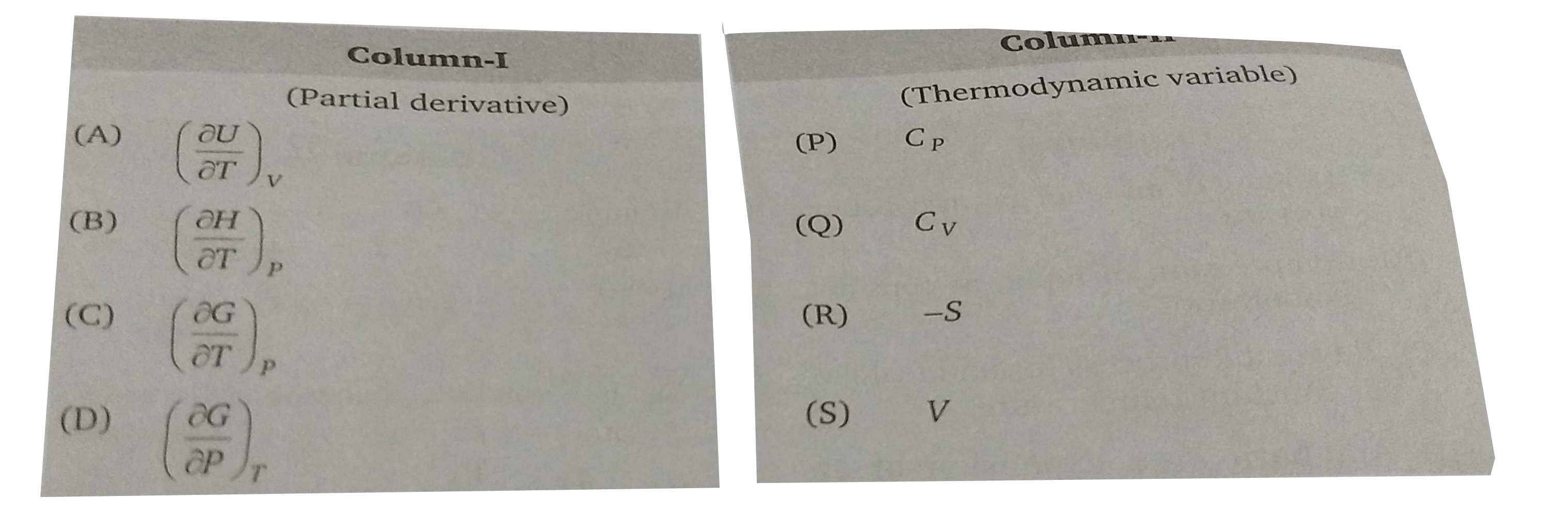For a perfectly crystalline solid Cp.m.=aT3, where ais constant. If Cp.m. is 0.42.J//K-"mol" at 10K, molar entropy at 10K is: Solution in Punjabi
0.42 J/k mol
0.14 J/K mol
1.12 J/K mol
zero
The correct Answer is:C
0.42=a(10)3⇒a=0.42×10−3
Sm=∫200Cp,mTdT
=∫200aT2dT=a3[203−0]
=1.12J/K−mol
Topper's Solved these Questions
- BOOK - NARENDRA AWASTHICHAPTER - THERMODYNAMICSEXERCISE - Level 3 - One Or More Answers Are Correct1videos
THERMODYNAMICS
- BOOK - NARENDRA AWASTHICHAPTER - THERMODYNAMICSEXERCISE - Level 3 - Match The Column2videos
THERMODYNAMICS
- BOOK - NARENDRA AWASTHICHAPTER - THERMODYNAMICSEXERCISE - Level 2 (Q.1 To Q.30)1videos
THERMODYNAMICS
- BOOK - NARENDRA AWASTHICHAPTER - STOICHIOMETRYEXERCISE - Level 3 - Subjective Problems20videos
STOICHIOMETRY
Similar Questions
Assume ideal gas behaviour for all the gases considered and neglect vibrational degrees of freedom. Separate equimolar sample. Separate equimolar samples of Ne, O2 , CO2 and SO2 were subjected to a two process as mentioned. Initially all are at same state of temperature and pressue.
Step I → All undergo reversible adiabatic expansion to attain same final volume, which is double the original volume thereby causing the decreases in their temperature.
Step → After step I all are given appropriate amount of heat isochorically to restore the original temperature.
Mark the correct option(s) :03:37View SolutionMatch the following columns
 07:55View Solution
07:55View SolutionWrite structure of 2,2-dimethylheptane.
05:14View SolutionWhat volume of a liquid (in L) will contain 10 mole ? If molar mass of liquid is 280 and its density is 1.4 g/mL.
07:44View SolutionFor a perfectly crystalline solid Cp.m.=aT3, where ais constant. If Cp.m. is 0.42.J//K-"mol" at 10K, molar entropy at 10K is:
03:32View SolutionFor a perfectly crystalline solid Cp.m.=aT3+bT,where a and b constant . If Cp.m.is0.40J/Kmol at 10K and 0.92J/Kmolat20K then molar entropy at 20k is:
02:27View SolutionFor a perfectly crystalline solid C_(p,m)=aT^(3)+bT , where a and b are constant. If C_(p,m) is 0.40 J/K mol at 10 K and 0.92 J/K mol at 20 K, then molar entropy at 20 K is :
View SolutionThe molar heat capacities at constant pressure (assume constant with respect to temperature) of A, B and C are in ratio of 1.5:3.0:2.0. If enthalpy change for the exotherimic reaction A+2B→3C at 300K is −10kJ/mol & Cp.m (B) is 300 J/mol then enthalpy change at 310 K is:
02:41View SolutionFor a perfectly crystalline solid C_("p,m") =T^(3)+bT , where a & b are constant . If C_("p,m") is 0.04 J//k-"mole" at 10 K and io 0.92 J//K-"mole" at 20 k, Then molar entropy at 20 k is.
01:43View SolutionFor a perfectly crystaline solid C_(p.m)=aT^(3) , where a is constant. If C_(p.m) is 0.42J//K-mol at 10 K , molar entropy at 10 K is:
02:28View SolutionWhat is the change in entropy when 2.5 mole of water is heated from 27∘ to 87∘C ? Assume that the heat capacity is constant . (Cp.m(H2O)=4.2J/g−kIn(1.2)=0.18)
07:57View SolutionThe entropy of a perfectly crystalline solid is zero at ……
07:57View SolutionEntropy of perfectly crystalline solid is taken as zero at 0 K.
03:57View SolutionFor a perfectly crystalline solid Cp.m=aT3, where a is constant. If Cp.m is 0.42 J/K − mol at 10K, molar entropy at 10K is
06:32View SolutionFor a perfectly cyrstalline solid Cp,m=aT3+bT, where a and b are constants. If Cp,m is 0.40 J/K mol at 10K and 0.92 J/K mol at 20K, then molar entropy at 20K is 0.2x×R joules. Then the value of x is
05:13View SolutionFor a perfectly cyrstalline solid Cp,m=aT3+bT, where a and b are constants. If Cp,m is 0.40 J/K mol at 10K and 0.92 J/K mol at 20K, then molar entropy at 20K is 0.2x×R joules. Then the value of x is
01:06View Solution

